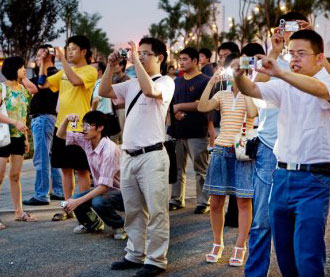A recent encounter with a group of young Chinese tourists left me wondering what it will be like for the rest of the world when China’s “little emperors” begin exerting influence over their nation’s policy.
I was at a Sawtelle cafe when I became aware of three young men speaking loudly to one another in Mandarin. They were tall, slim, light-skinned, well-dressed, like many young visitors from north coastal China. Not only were they speaking in voices loud and abrasive enough to disturb everyone, they seemed utterly oblivious to everyone around them. One carelessly yanked back his chair, knocking it hard against the back of mine. He made no apology and ignored my irate backward glance at him. I shoved my chair back hard and knocked it into his. He didn’t react. I left it at that.
Of course these young men could have been from Taiwan. They could have been from Australia for all I knew, but their demeanor put me in mind of the kind of spoilage only attainable by a family that puts a lone child at the center of their universe. In other words, the four-two-one phenomenon: four grandparents, two parents and one spoiled-rotten child. In short, they seemed to embody the little emperor syndrome emerging in a nation which, in 1978, began an experiment unique in world history — the one-child policy.
Before I continue, let me clear up a few misconceptions about that policy. First, it only impacts about 36% of China’s families, the urbanites who can’t afford to buy their way out of the legal limit by paying stiff fines and other penalties. Rural families, ethnic minorities, couples made up of two only-children, families returning from extended overseas sojourns and those falling under numerous other exceptions are also excluded from this limit.
Secondly, China intended the policy to last for a single generation. There has been talk of ending it between 2015 and 2020. The policy has been credited with preventing about 400 million births and the attendant economic and environmental burdens for a nation emerging from near destitution after thirty years of communist central economic planning.
Thirdly, no study has yet conclusively shown that only children suffer any more social maladjustment problems than peers with siblings. But the absence of any quantifiable finding doesn’t rule out the inevitable impact of growing up in a family eager to make up for two generations of privation by devoting every family resource to its lone progeny. It would defy common sense to assume that the little emperors have the same perspective as their peers. A sense of unquestioned centrality is bound to produce a high degree of insensitivity to the rights and feelings of others.
At the moment most little emperors are too young to have direct input into their nation’s policies or official attitudes. Certainly, none of China’s top leaders or even their immediate lieutenants belong in that category. But they are likely to have kids who do. But long before their kids move into the top tiers of political, social and economic power, the world will feel the impact of the one-child policy on China’s demeanor to the world. Just as China’s families accord top priority to conferring every conceivable advantage on their little emperors, China as a nation is according top priority to leaving the little-emperor generation a legacy of global primacy. Its space ambitions, territorial aggressiveness, military expansion, economic expansion all point to a national drive to the top.
There’s nothing wrong with this. American leaders seek to leave future generations in as good as or better position than we enjoy today. Many nations strive to improve their positions relative to the rest of the world. The difference is that China is the world’s most populous nation on track to becoming the world’s biggest, richest and perhaps even the most powerful nation within a generation. By the time the little emperors are old enough to run China, China will be in position to make the world feel its collective character. If that national character turns out to be anything like the behavior and attitude that irked me, the world has reason for collective concern. A superpower run by little emperors would certain earn the enmity of the world.
But such a nation would also be vulnerable to a very different fate. The three generations of Chinese who preceded the little emperors were the products of a world that had plundered, exploited, humiliated and scorned their nation. Chinese were collectively determined to make every sacrifice needed to build a nation equal to all foreign pressures—and succeeded. But the generation that will inherit China has grown up with an unearned sense of personal importance. It’s hard to see how a nation of little emperors will be able to call up the spirit of mutual respect and collective sacrifice needed to keep together a multi-cultural, multi-ethnic empire like China.

